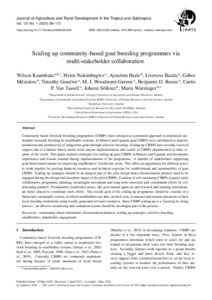| dc.date.accessioned | 2020-06-02T08:19:29Z | |
| dc.date.available | 2020-06-02T08:19:29Z | |
| dc.date.issued | 2020-05-01 | |
| dc.identifier | doi:10.17170/kobra-202005281298 | |
| dc.identifier.uri | http://hdl.handle.net/123456789/11578 | |
| dc.description | Gedruckte Ausgabe im Verlag kassel university press erschienen. | ger |
| dc.language.iso | eng | |
| dc.rights | Namensnennung 4.0 International | * |
| dc.rights.uri | http://creativecommons.org/licenses/by/4.0/ | * |
| dc.subject | community-based institutions | eng |
| dc.subject | dissemination partners | eng |
| dc.subject | scaling up strategies | eng |
| dc.subject | selective breeding | eng |
| dc.subject | smallholders | eng |
| dc.subject | stakeholder engagement | eng |
| dc.subject.ddc | 630 | |
| dc.title | Scaling up community-based goat breeding programmes via multi-stakeholder collaboration | eng |
| dc.type | Aufsatz | |
| dcterms.abstract | Community-based livestock breeding programmes (CBBPs) have emerged as a potential approach to implement sustainable livestock breeding in smallholder systems. In Malawi and Uganda, goat CBBPs were introduced to improve production and productivity of indigenous goats through selective breeding. Scaling up CBBPs have recently received support due to evidence-based results from current implementation and results of CBBPs implemented in other regions of the world. This paper explores strategies for scaling up goat CBBPs in Malawi and Uganda, and documents experiences and lessons learned during implementation of the programme. A number of stakeholders supporting goat-based interventions for improving smallholders’ livelihoods exists. This o ers an opportunity for di erent actors to work together by pooling financial resources and technical expertise for establishment and sustainability of goat CBBPs. Scaling up strategies should be an integral part of the pilot design hence dissemination partners need to be engaged during the design and inception stages of the pilot CBBPs. Creation of self-sustaining CBBPs requires early collaborative programme planning, meaningful investment and long-term concerted and coordinated efforts by collaboratingpartners. Permanently established actors, like government agencies and research and training institutions, are better placed to coordinate such e orts. The overall goal of the scaling up programme should be creation of a financially sustainable system, in which smallholders are able, on their own, to transact and sustain operations of their local breeding institutions using locally generated revenue/ resources. Since CBBP scaling up is a ‘learning by doing process’, an e ective monitoring and evaluation system should be an integral part of the process. | eng |
| dcterms.accessRights | open access | |
| dcterms.creator | Kaumbata, Wilson | |
| dcterms.creator | Nakimbugwe, Helen | |
| dcterms.creator | Haile, Aynalem | |
| dcterms.creator | Banda, Liveness | |
| dcterms.creator | Mészáros, Gábor | |
| dcterms.creator | Gondwe, Timothy | |
| dcterms.creator | Woodward-Greene, Mary Jennifer | |
| dcterms.creator | Rosen, Benjamin D. | |
| dcterms.creator | Van Tassell, Curtis P. | |
| dcterms.creator | Sölkner, Johann | |
| dcterms.creator | Wurzinger, Maria | |
| dc.subject.swd | Ziegenzucht | ger |
| dc.subject.swd | Kleinbauer | ger |
| dc.type.version | publishedVersion | |
| dcterms.source.identifier | EISSN 2363-6033 | |
| dcterms.source.issue | Vol. 121 | |
| dcterms.source.journal | Journal of Agriculture and Rural Development in the Tropics and Subtropics | eng |
| dcterms.source.pageinfo | S. 99-112 | |
| dcterms.source.volume | 2020 | |
| kup.iskup | false | |


